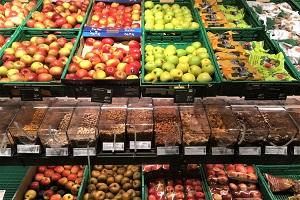
With the UN Food Systems Summit taking place next week under the auspices of the UN General Assembly (23 September 2021), we must recognize that the food systems we have built over recent decades are unsustainable. The food choices we make every day as consumers and producers of food are having a large impact on our environment, human health, societies and climate change.
This issue is close to home at UNECE, which deals with standards, norms and conventions that impact the food we eat every day. You may not realise it, but these include over 100 international agricultural quality standards, developed by experts working together at UNECE to set minimum requirements for fresh fruit and vegetables, dried fruit and nut, meat, eggs and more.
Integrated approaches needed
Overall, our food system needs an urgent and sustainable transformation. To achieve this, governments must adopt a coordinated policy approach grounded in an in-depth understanding of the interlinkages between food production, environmental impacts and healthy diets.
To ensure sustainable outcomes, integrated, cross sectoral measures are vital. This is at the heart of UNECE’s pioneering “nexus” assessments under the Convention on the Protection and Use of Transboundary Watercourses and International Lakes and its Protocol on Water and Health, which have helped 20 countries in 7 shared basins to sustainably address the interconnected objectives of water management, food and energy production and environmental protection.
Reducing food loss and waste so that more of what is produced with precious resources reaches our plates is vital. Currently a third of all food produced globally is lost or wasted along the supply chains or by consumers, and 25% of world’s fresh water supply is used to grow food that is never eaten.
UNECE is working to deliver solutions in this area, including a blockchain-powered tool FeedUp@UN which enables the systematic measurement and analysis of food lost along the supply chain, opening up circular economy opportunities for otherwise wasted food. Linked to its work on Agricultural Quality Standards, UNECE has also developed tools and methodologies to improve management of fresh produce, and to measure losses in agricultural supply chains, thus enabling reduced food losses.
In addition, UN/CEFACT has developed standards for sustainable fisheries management, and its e-business standards cover digital quality and safety certificates, helping to make trade more effective. Among wider efforts to transform food systems into drivers for sustainable development, we are also working with FAO on the role of forests as important providers of nutritious and healthy food.
The case of nitrogen
In an article for the International Day of Clean Air for blue skies on 7 September, I drew attention to one component of the food system which is often forgotten: nitrogen. Nitrogen is a central element to our food systems as it links air quality, soils, water and food. Nitrogen (N) is an element of chlorophyll in plants and of protein (amino acids) in animals and humans. As such, it is a major nutrient to allow food, fibre and biofuel production.
Over the past 100 years, the massive use of fertilizers and the production and use of manure in agriculture lead to significant nitrogen emissions to air and releases to water and land. Among its dire consequences are greenhouse gas emissions and air, soil and water pollution that damage human health, threaten biodiversity of forests and rivers, and lead to coastal and marine pollution that exacerbates the effects of climate change. In some European countries, over 40 per cent of air pollution-related mortality can be attributed to emissions of nitrogen compounds from agriculture.
Globally, two thirds of nitrogen pollution comes from agriculture. Sustainable food systems are thus impossible without sustainable nitrogen management, where I am proud that guidance developed under the UNECE Convention on Long-Range Transboundary Air Pollution can inform the action we need. This can help foster a “nitrogen circular economy”, reducing N losses and promoting recovery and reuse.
Transforming our food systems is a task that transcends many policy fields. We need to make sure that we tackle the challenges in an integrated way so that we can reap co-benefits for food security, environmental integrity, health and development. We have to exploit all possible solutions and we have to do it now. Let’s take the Food Systems Summit as an opportunity to openly discuss all of the options on the table to rethink and transform our food systems for a sustainable future.